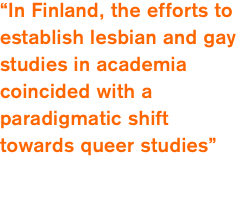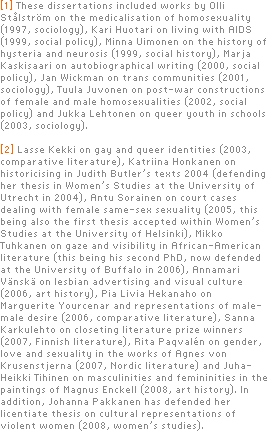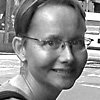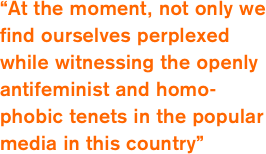The present article discusses the history, current situation and the future of queer studies in Finland. We begin by tracing its path of institutionalisation from the early lesbian and gay studies to queer studies, hereby establishing an archive of the intertwinedness of women’s and queer studies in Finland. The thrust of this text is our growing concern regarding the present hostile atmosphere towards these disciplines both in the fields of research and teaching, and the possible effects thereof on their joint future. Back in the 1990s, those scholars whose work was informed by lesbian, gay and queer studies were still able to receive public funding for their PhD theses. However, in recent years the funding bodies in Finland have grown more cautious and traditional in their decisions and prefer to fund larger projects representing “the traditional core” of respective mother disciplines only. This change has proven to be most problematic for individual queer scholars in their post-doctoral phase. At the moment, not only we, the writers of this piece, find ourselves perplexed while witnessing the openly antifeminist and homophobic tenets in the popular media in this country. As studying these disciplines is made to appear less profitable and attractive, the current hostility might even make it more difficult to offer courses related to women’s and queer studies. If this leads to declining numbers of students, it could again be used as an argument for reducing and suppressing various women’s studies centres. This has become a genuine threat, since the Finnish university landscape is currently in the rapid process of profound restructuring.

The establishment of institutional structures for Queer Studies began in Finland in the late 1980s and early 1990s with the initiation of Gay and Lesbian Studies. Since the publication of Rakkauden monet kasvot [The many faces of love], the first scholarly anthology on the lives of lesbians and gays in 1984, there had been various attempts to establish collaboration among Finnish lesbian and gay scholars. An informal sexuality studies working group existed in Finland between 1987 and 1989, and in 1988 the student union of the University of Turku organised an international conference titled Visions of humanity – Changing conceptions of gender, with a spin-off anthology What’s that got to do with my gender? coming out in 1989. The first published monograph in lesbian studies was Ritva Hapuli’s Naisia rakastavat naiset [Women loving women] in 1989 which was based on her MA thesis. However, only the continuous activities of the national Lesbian Studies Network (LSN), founded in 1990 by Tuula Juvonen, gained momentum and proved to be long-lived enough to create a sufficiently large group of students and scholars to maintain some enduring academic presence and structures. LSN was able to produce a quarterly newsletter, thanks to the copy and mailing facilities financed by a local branch of the national lesbian and gay organisation Seta. It kept providing the members with information and support in a time when Internet was not yet readily available. Later on, similar financial favour was granted for Gay Studies Network (1991–1993, founded by Jukka Lehtonen) with which LSN cooperated smoothly. Furthermore, the collaboration with The Feminist Association Unioni made it possible for LSN to organise two weekend seminars for those “curious about lesbian studies”. Before long, LSN felt up to offering its own workshops at the annual national Women’s Studies conferences (sporadically from 1993 and onwards). Also contacts abroad were established, in those times most notably to the Netherlands. Since LSN never received any external funding, it relied on unpaid voluntary work – something which eventually led to its self-abolition in 1995. However, before that LSN succeeded to create some more stir. Local activists, led by Kati Mustola and Paula Kuosmanen, in affiliation with the newly founded Christina Institute of Women’s Studies, organised the first lecture series on lesbian studies at the University of Helsinki in 1991. It was followed by a second one in 1993 and a third one on gay studies in 1994. In 1995, the series was followed by a course on queer representation in film and media. The lecture series was succeeded by a groundbreaking anthology on Lesbian Studies Uusin silmin [Lesbian glances at arts and culture] (1996), which introduced the post-structuralist theoretical turn to Finnish-speaking readers, and Homo fennicus (1998), the first Finnish collection of texts about gay studies. The student activists also established a queer studies group which held its meetings from 1992 to 1997 at the University of Helsinki. While students were writing their MA theses on lesbian and gay studies at several universities, the first licentiate thesis in lesbian studies by Marja Kaskisaari, Lesbokirja [A Lesbian Book, 1995], was defended at the University of Jyväskylä. Lesbian students in the arts and social sciences in Finland were active in the 1990s, but the first Finn to defend a PhD thesis on a homosexual topic was a charming man. In 1994, Jan Löfström defended his PhD thesis in sociology at the University of Essex, UK. His study concerns the construction of homosexuality in agrarian Finland at the turn of the 20th century, and was rewritten for publication for a Finnish audience as a monograph called Sukupuoliero agraarikulttuurissa [Sex and Gender Difference in Agrarian Culture, 1999]. Tuija Pulkkinen, a specialist in feminist political theory, also wrote her philosophical work abroad, at Berkeley, yet she defended her thesis The postmodern and political agency at the University of Helsinki in 1996. In Finland, the efforts to establish lesbian and gay studies in academia coincided with a paradigmatic shift towards queer studies. What may have started in the 1980s as work based on identitarian positioning has in the meanwhile transformed in the texts of various scholars into a more nuanced understanding of the various discursive practices informing the creation of genders and sexualities. This transition has been a more organic than antagonistic one, possibly also because in those early days nobody had academic positions to defend, and post-graduate studies were taken up out of passion and intellectual curiosity rather than due to a conscious career decision. Since lesbian and gay studies never were, and still are not academic disciplines in Finland in their own right, the subsequent theses were also submitted within several disciplines. While a historical perspective remained strong in Finnish queer studies, the first dissertations were followed by works mostly, yet not solely, in the social sciences.[1] With some delay, works within literary theory and studies in visual culture started to emerge as well. Works in cultural theory and cultural studies now form a significant part of the corpus.[2] Lately, discussion on queer as a methodological concept has entered as a recurrent topic in academic works by many Finnish queer scholars The first generation of lesbian and gay scholars was forced to apply a more or less improvised DIY approach to its academic pursuits. Also for the second one, following closely at the first’s heels, there was little to no teaching or competent supervision available in Finland. Therefore many left to study abroad, created study groups and relied on peer supervision. |  |  
|









